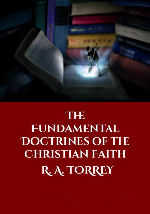Philip’s New Testament in Modern English was made by an Anglican clergyman for his youth group, making the Bible sound relevant and in the language of the day.
This version of the Bible was made under the authority of the Anglican Church of England (Anglican clergyman J.B. Philips) 1958 for Anglican youth in English they could understand.
It is described as “up-to-date and forceful, involving the reader in the dramatic events and powerful teaching of the New Testament. It brings home the message of Good News as it was first heard two thousand years ago.” Wikipedia.org

Torrey Fundamental Doctrines of the Christian Faith is a set of 15 chapters on various doctrinal themes in the Bible. Some of these chapters are...
1. Inspiration, or to what extent is the Bible Inspired of God?
2. The Christian conception of God...
4. The Deity of Jesus Christ
5. Jesus Christ, a Real Man
6. The Personality of the Holy Spirit
7. The Deity of the Holy Spirit and the Distinction between the Father, Son and Holy Spirit
8. The Atonement...
9. The Distinctive Doctrine of Protestantism: Justification by Faith
10. The New Birth
11. Sanctification
12. The Resurrection of the Body of Jesus and of our Bodies
13. The Devil
14. Is there a Literal Hell?
15. Is Future Punishment Everlasting?
Published in 1918.
Downloads:
PDF: Torrey Fundamental Doctrines
theWord: Torrey Fundamental Doctrines
MySword: Torrey Fundamental Doctrines
eSword: Torrey Fundamental Doctrines
Version Information
“J.B. Phillips (1906-1982) was well-known within the Church of England for his commitment to making the message of truth relevant to today’s world. Phillips’ translation of the New Testament brings home the full force of the original message. The New Testament in Modern English was originally written for the benefit of Phillips’ youth group; it was later published more widely in response to popular demand. The language is up-to-date and forceful, involving the reader in the dramatic events and powerful teaching of the New Testament. It brings home the message of Good News as it was first heard two thousand years ago.” (https://www.biblegateway.com/versions/JB-Phillips-New-Testament/)
- The version of 1961 can be read online at http://www.ccel.org/bible/phillips/JBPNT.htm
Philip’s New Testament in Modern English

